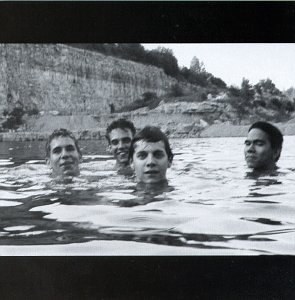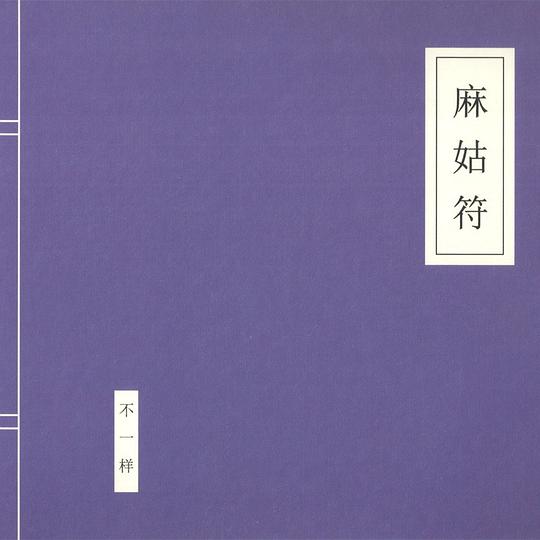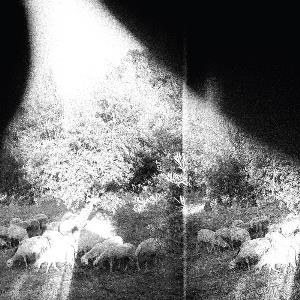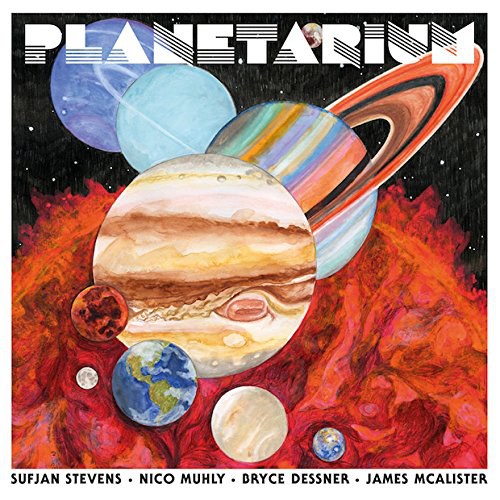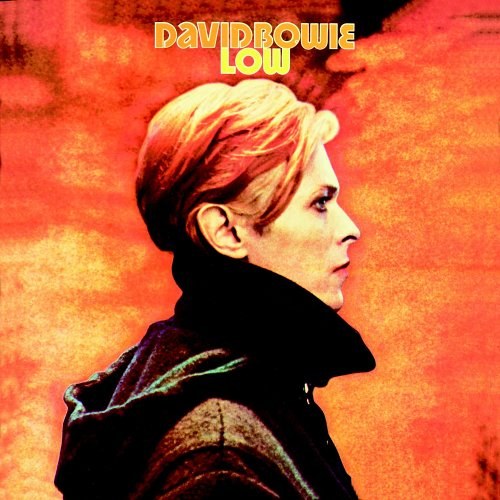Planetarium is an album co-composed by four musicians: Bryce Dessner, James McAlister, Nico Muhly, and Sufjan Stevens. Flanked by a string quartet and a consort of seven trombones, this unique collaborative ensemble has assembled an expansive song cycle that explores the Sun, the Moon, the planets and other celestial bodies of our solar system (and beyond) through soundscape, song, science and myth.
The subject of the album is not just the wilderness of outer space, but the interior space of human consciousness and how it engages with divinity, depravity, society and self—what does it mean to be human? This existential question rings clear from the opening lyric: “What’s right and what’s wrong?” The 75 minutes of music that follow provide a complex thesis: to be human is to be a total mess. The result of this creative alliance is a musical and aesthetic journey as far-reaching as its subject: from lush piano ballads to prog-rock political anthems, curious electronic back-beats to classical cadenzas, the vast musical styles seek to explore the diversity and mystery of our cosmos.
Planetarium is a concept album that occasionally gives way to ambient interludes and majestic brass chorales, buttressed by a percussive drive that keeps the momentum skyward. In spite of all the experimentation in sound and style, Sufjan’s vocals provide a clear and coherent center of gravity. The album includes some of his most diverse vocal performances to date (from soft hush to guttural scream), and whether he’s singing through effects pedals, vocoders, auto-tune or not, his voice delivers an ambitious flight map through the cosmos.
♆
The project started when the Dutch concert hall Muziekgebouw Eindhoven commissioned Nico to create a new piece for their audience, and Nico immediately thought of his friends Bryce and Sufjan.
“I’d known Sufjan for years,” says Nico, “and Bryce and I had been in each other’s business” — but, says Bryce, “we’d never worked on something this ambitious together.” Each of the four brought their discrete and complementary strengths to the project. Nico’s experience with composing music for cathedral choirs and symphony orchestras provided the framework for the piece, while Bryce brought his own sense of composition and orchestral color.
“Of the three of us, Bryce is the most virtuosic at his instrument,” said Nico. A studied and accomplished classical musician, Bryce was also fluent in Nico’s unique musical language, and added a layer of rhythmic complexity to the songs.”
Sufjan became the driver behind the “song” part of the song cycle. (Bryce: “I think ‘seven trombones’ was enough to lure Sufjan into it.”) Sufjan also brought lyrics, and with them, the larger ideas around which Planetarium revolves: mythology and astrology, the ancient concept that stars and planets of the night sky represent gods, heroes and monsters. As the project evolved, the group expanded the idea to encompass science and astronomy.
Sufjan also introduced frequent collaborator James McAlister to Bryce and Nico, and James brought the beats—drums, percussion and electronic sequencing.
“Once James got involved,” says Sufjan, “he was like the glue.” Nico might compose a thunderous passage for the orchestra; Bryce might conceive of an elaborate guitar harmony; Sufjan would write the verses and refrains; and James’ beats and electronic textures would bind these disparate contributions into a continuous movement of music.
Nico describes the product of those early working sessions as something like a single manuscript, overwritten by many hands, with each individual contribution legible on the finished document.
♀
In addition to the collaboration among the four musicians, Planetarium also bears the marks of its long evolution from writing to live performance to recording.
“Fast, cheap and out of control,” says Sufjan of those early moments in their process together. It was a “feverish” period of creation, he says—literally; he fell ill just as they were preparing to present the project in its earliest version, and had to perform one of the songs as an instrumental because he had gotten too sick to finish writing the words.
The piece then evolved with sporadic but intense flashes of activity. For each performance, the band continued to fine-tune the cycle, adding new elements and refining or replacing the old.
The studio version took the iterative process forward by another leap. “We had recorded all the arrangements and the live parts in a studio after our last performance,” says Sufjan, “so years later when we all kind of settled down, we said, ‘Let’s open Pandora’s box.’”
James and Sufjan, who have worked together on all of Sufjan’s records since Illinois, inverted their usual process of adapting studio music into a live set. Along the way, Planetarium was “built up and torn down multiple times,” says Bryce.
“The record has a footprint of all the various timelines,” says Bryce, “you hear things from the very first jam sessions and you hear things from a month ago.”
But despite that initial frenetic energy, a year passed between the first performance of the project and the original recording, and then several more years passed before they finally set out to finish it. By that time the four friends were in different places, both literally and figuratively.
Bryce, who at the start of the project was Sufjan’s neighbor in Brooklyn, had released several albums of his own instrumental compositions and helped score last year’s Oscar-winning best picture The Revenant and then moved on to his new home in Paris.
Nico had taken a break from composing any electronic music whatsoever—instead creating hours of music for classical instruments and voices, including a new viola concerto, and a new commission—Marnie—for the Metropolitan Opera.
Sufjan had released Carrie & Lowell and, along with James, taken the album on tour.
⛢
The band wasn’t the only thing that had changed since creating and recording the piece; the rest of the world had changed too. The album’s mythology and astrology underpinnings suddenly seemed less novel and more “prescient and relevant to the state of the world now,” says Sufjan, “As I kept listening to it, I felt this kind of utter terror and foreboding.”
“We’ve returned to the question of identity and humanity and human rights, and what does it mean to be a person in our world? What is our relationship to our world, and the environment?” says Sufjan, “What does it mean to believe in a divine being, and what does that divine being require of us?”
“That divine being,” says Sufjan, “is often inspired by the cosmos.”
Compared to “the unreachable, insurmountable, distant mystery of the universe,” says Sufjan, “all of a sudden it feels so small—it feels so claustrophobic, on planet earth. I see now why we look to the stars,” says Sufjan.
